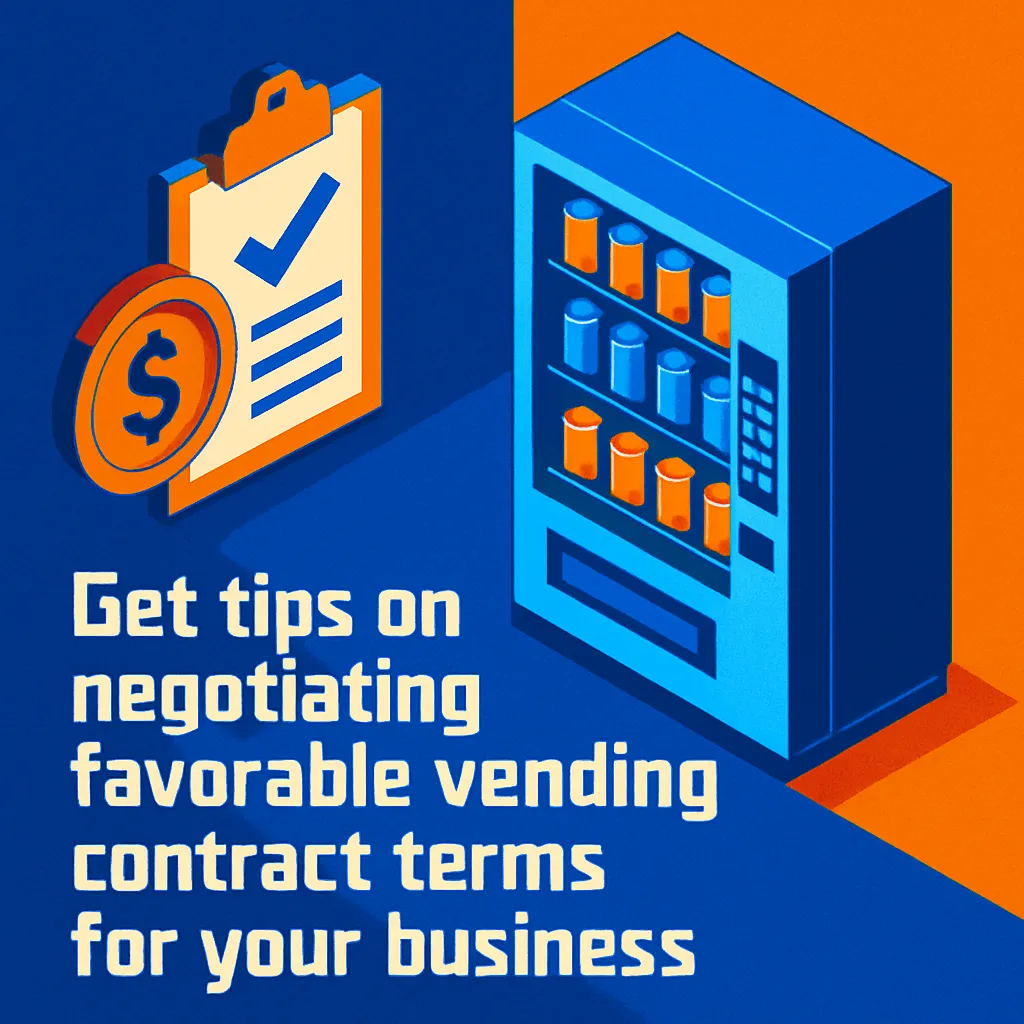How to Negotiate a Vending Contract
Get tips on negotiating favorable vending contract terms for your business.
Back to Vending Contracts ResourcesGet tips on negotiating favorable vending contract terms for your business.
Back to Vending Contracts ResourcesNegotiating a vending contract effectively can secure better commission rates, customized inventory, and superior service. Understanding key clauses and preparing thoroughly will empower you to strike a deal that truly benefits your business.
![]() Define your needs clearly before entering negotiations
Define your needs clearly before entering negotiations
![]() Focus on favorable commission rates and service level agreements
Focus on favorable commission rates and service level agreements
![]() Understand contract clauses like exclusivity and termination
Understand contract clauses like exclusivity and termination

Securing a vending machine for your business is a strategic decision that can enhance employee morale, provide convenient refreshments for customers, and even generate a passive revenue stream. However, the true value you get often hinges on how well you negotiate the vending contract. Don't just accept the first offer; a thoughtful negotiation can lead to more favorable terms, tailored product selections, and better service agreement that maximize benefits for both parties.
Before you even begin discussions, clearly define your expectations. What types of machines do you need? What products do you want stocked? What are your preferred service frequencies for restocking and maintenance? Having these points clear will help you present a strong case. One of the most crucial aspects is the commission rate. While some contracts offer a fixed monthly fee, many operate on a commission-based system where you earn a percentage of sales. Aim for a transparent and fair percentage that reflects your location's foot traffic and sales potential. Don't hesitate to compare offers, which can be invaluable for understanding market rates and strengthening your bargaining position. Learning about commissions in vending contracts can provide more insight into this area.
Every vending contract includes various clauses that specify the terms of service. Pay close attention to the length of the contract, renewal options, and especially the termination clause. You want flexibility, especially if the service doesn't meet expectations. Understand the conditions for early termination and any associated penalties. Inquire about exclusivity clauses; these dictate whether you can have other vending providers on your premises. Sometimes, a non-exclusive agreement can foster competition and better service. Service Level Agreements (SLAs) are also vital; these should outline specifics like restocking schedules, required response times for repairs, cleanliness standards, and customer service availability. For a deeper understanding of what to look for, reviewing common clauses in vending contracts is highly recommended.
Beyond financial terms, a successful negotiation customizes the vending program to your specific needs. This includes dictating the product mix, whether you prefer healthy options, specific snack brands, or a particular beverage selection. Many providers are happy to tailor their offerings, especially if you have a clear understanding of your preferences. Also, discuss who handles repairs and maintenance. Most full-service providers manage this entirely, but confirm response times and guarantees in writing. Lastly, never underestimate the power of a strong relationship with your provider. A good partnership ensures seamless service and a willingness to adapt as your needs evolve. If the partnership isn't working out, knowing how to cancel a vending contract is important.
The first step is to clearly define your needs, including the types of machines, products, and service frequency you require.
Commission rates are very important as they directly impact your potential revenue. Always aim for a transparent and fair commission structure.
Negotiating for exclusivity can be beneficial if you want to ensure consistent service and product offerings, but consider its implications on vendor competition.
SLAs should cover restocking frequency, response time for repairs, cleanliness standards, and customer service protocols.
Absolutely. Most vending providers are flexible and willing to customize product selections, including a focus on healthy choices, to meet your clientele's preferences.
Contract lengths vary but commonly range from one to three years. Shorter terms can offer more flexibility, while longer terms might secure better rates.
Carefully review all termination clauses, including conditions for early termination, notice periods, and any associated penalties to protect your interests.
Many full-service vending providers offer machines at no cost, with their revenue coming from product sales and agreed-upon commission sharing.
Yes, always solicit and compare proposals from several providers. This allows you to leverage competition to secure the best terms and services.
The contract should clearly outline who is responsible for machine maintenance, repairs, and how often preventative maintenance will occur to ensure reliable operation.